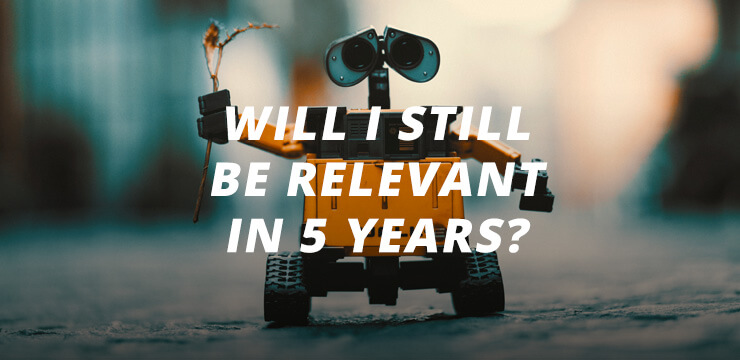For as long as humans have been making machines, we have been fascinated with the deliciously horrifying idea of them coming alive — and turning against us.
These fears tend to conjure up a picture of dusty, apocalyptic landscapes and malicious beasts made of steel, however, another scenario is on the rise.
“Machines taking over,” is far more likely to manifest in the workplace than as a conscious rebellion. In fact, it is already happening. Many tasks that used to require manpower are being replaced by bots and A.I., and the list of jobs that no longer need a human is growing fast.
Artificially intelligent software programs are predicted to eliminate 6% of the jobs in the U.S. in the next five years. These jobs are not limited to low-wage positions or uneducated individuals. Accountants, for example, have a 95% chance of losing their profession to automation. The legal sector faces an equally unstable future.
This topic has gotten a lot of attention recently, so it got me thinking — what about my job in HR?
Tech, Social Recruitment & Analytics Have Changed the Nature of HR
As a training strategist, I hail from HR. As part of this department, I am aware of how much the field has changed over the past decade.
Starting with a business shift in the way that talent management is perceived: integrated talent has been put on the back burner in favor of productivity-oriented solutions that favor employee engagement, teamwork, innovation, and collaboration.
Due to the rise of social media, e-recruitment and social media recruitment through platforms such as Linkedin, Facebook and Twitter have quickly become the primary methods for finding and attracting new talent.
Another area that I have seen directly affect my line of work is the huge shift in learning content. Training magazine noted that, since 2009, companies have seen the numbers of instructor-led training drop from 77% to 32% in favor of machine teaching.
Technological advances have lead companies to embrace data-driven insights in order to identify trends in employee work habits. This shift is radically changing the way we make decisions about talent management and organizational performance.
In line with this mindset, analytics are now an integral component of common HR software such as Oracle, SAP, SuccessFactors, ADP, Cornerstone, and Visier — but just collecting numbers isn’t enough.
HR Jobs Are Being Replaced by Technology

With an influx of data, artificial intelligence is the natural next step. It is the powerhouse that takes this ocean of digits and translates it into digestible nuggets of information.
That isn’t all that A.I. is being used for in HR. Many processes such as pre-screening, interviewing, onboarding, new-hire orientation, employee assessment, and internal job search are susceptible to automation.
The company Good&Co, for example, offers software which can score a candidate’s personality and match him or her against peers and other high performers in the company for fit — before the candidate is interviewed.
There is no doubt such cognitive tools will reduce the number of administrative positions necessary in the human resources department. However, before packing a backpack of canned food and running for the hills, let’s take a moment to reflect on the situation.
How At Risk is Your HR Job?
The tools of AI and robotic process automation will dramatically change the face of HR, but also simultaneously raise the value of the department. Rather than looking at artificial intelligence as a monster after our jobs, we should see it as a stepping stool with which we can reach the higher shelves of productivity.
Oxford University academics calculated the susceptibility of each job to automation based on nine key skills required to perform it. Human resources administrative worker ranked 54th out of a list of 366 jobs, in other words ‘quite likely’ to be automated.
Human resource managers and directors, on the other hand, dropped down on the list to 225th — ‘not very likely’ to be automated. This points at a trend of HR professionals working as consultants, improving employee engagement, and making critical decisions with the help of A.I. aids.
Valuable Traits in an Automated World

For all the barriers A.I. is shattering, there are still innate human qualities which algorithms won’t be able to mimic anytime soon. Some jobs will disappear, but others will arise where these qualities are needed.
Honing in on the following three skills can increase your value in an artificially intelligent future:
Computational thinking
The ability to manage the large amounts of data HR processes, spot patterns, and most importantly make sense of it in way that is useful to human ecosystems is more vital than ever. After all, there needs to be someone managing the robots.
Empathy and relationship building
Despite what the movie Her would have you believe, we are still a long way off from creating a machine with an ability to truly empathize with human emotion. This trait is central to the field of HR, and one without which people management would not be possible.
Creativity
Robots can group data and offer suggestions based on patterns or trends they observe, but as far as offering real original thoughts — the human mind still reigns supreme. In a rapidly evolving work environment, now more than ever, creativity and originality are essential to carry us forward.
In an AI saturated workplace, the question of an HR professional’s relevancy will depend on what they can do with and in addition to automation. Data-input and paper pushing will soon be a thing of the past, and in my opinion, good riddance!
 With an influx of data, artificial intelligence is the natural next step. It is the powerhouse that takes this ocean of digits and translates it into digestible nuggets of information.
That isn’t all that A.I. is being used for in HR. Many processes such as pre-screening, interviewing, onboarding, new-hire orientation, employee assessment, and internal job search are susceptible to automation.
The company Good&Co, for example, offers software which can score a candidate’s personality and match him or her against peers and other high performers in the company for fit — before the candidate is interviewed.
There is no doubt such cognitive tools will reduce the number of administrative positions necessary in the human resources department. However, before packing a backpack of canned food and running for the hills, let’s take a moment to reflect on the situation.
With an influx of data, artificial intelligence is the natural next step. It is the powerhouse that takes this ocean of digits and translates it into digestible nuggets of information.
That isn’t all that A.I. is being used for in HR. Many processes such as pre-screening, interviewing, onboarding, new-hire orientation, employee assessment, and internal job search are susceptible to automation.
The company Good&Co, for example, offers software which can score a candidate’s personality and match him or her against peers and other high performers in the company for fit — before the candidate is interviewed.
There is no doubt such cognitive tools will reduce the number of administrative positions necessary in the human resources department. However, before packing a backpack of canned food and running for the hills, let’s take a moment to reflect on the situation.
 For all the barriers A.I. is shattering, there are still innate human qualities which algorithms won’t be able to mimic anytime soon. Some jobs will disappear, but others will arise where these qualities are needed.
Honing in on the following three skills can increase your value in an artificially intelligent future:
For all the barriers A.I. is shattering, there are still innate human qualities which algorithms won’t be able to mimic anytime soon. Some jobs will disappear, but others will arise where these qualities are needed.
Honing in on the following three skills can increase your value in an artificially intelligent future:

